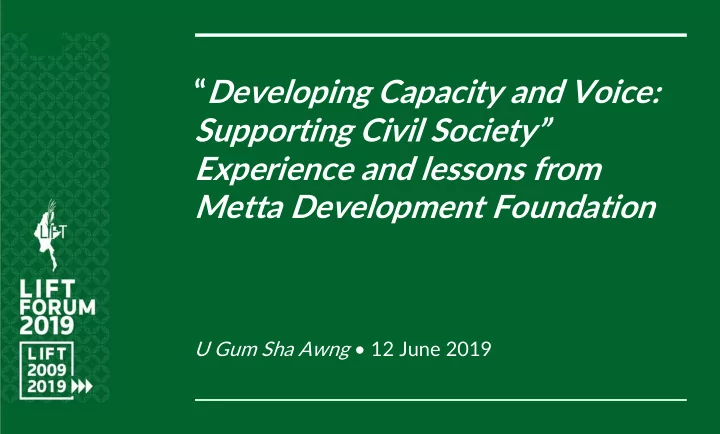

“ Developing Capacity and Voice: Supporting Civil Society” Experience and lessons from Metta Development Foundation U Gum Sha Awng • 12 June 2019
Introduction ● Metta Development Foundation, established 1998, to assist communities recover from the devastating consequences of conflict and humanitarian emergency ● The primary objective of Metta is the evolution of self-reliant and peaceful societies through social and economic growth ● After 2008 Cyclone Nargis, it reached 700 staff, working in 4 States and 4 Regions, 1,000 communities. ● Conflict affected areas: farmers’ capacity building, livelihood, land and nature resource, migration and climate change ● Work with Civil Society at national and sub-national level ● Metta worked through different political transitions over 2 decades
Institutional Yearly Grant Received: 1998 to 2018 growth ● 200 staff to 700 staff, 2 12,000 11,021 million to 11 million USD 10,174 10,000 ● Development of financial & 8,232 Thousands in USD 8,069 HR Systems 8,000 7,361 ● Restructuring Governance 7,539 7,381 5,907 and Management 6,627 6,000 6,241 Based on stakeholder trust ● 5,145 4,000 was able to serve IDPs 2,078 immediately when conflict 2,216 641 2,000 resumed in Kachin in 2011 633 31 164 233 329 506 1,311 - 98-99 99-00 00-01 01-02 02-03 03-04 04-05 05-06 06-07 07-08 08-09 09-10 10-11 11-12 12-13 13-14 14-15 15-16 16-17 17-18 December 18 April 18 -
A few ● Community driven and farmer empowerment approach (Upland highlights Rice FFS, Community based nature resource management, from Metta’s Value Chain, farmer seed producer group etc.) work ● Civil Society Strengthening through various mechanism including LIFT townships upland fund and migration studies (working with over 200 CSOs across the country) ● Collaboration with government departments at national and sub national level – mainly agriculture and forestry departments ● Joining and leading the CSOs networking and platform based on various issues at national and subnational for policy advocacy (land, nature resource governance, Peace and Humanitarian etc.)
Key learning, ● Farmer Field School for upland rice in Southern Shan: 150 communities, capacity and System of Rice Intensification method for upland rice, average yield between 35 to 50 basket per acre, reduce significant use of chemical, voice farmer capacity enhance, emerging of community leaders ● Rice Seed Gower group (210 member, 6 townships in Ayeyarwady Delta): Produce and preserve local quality rice seeds, provide farmer led education and extension, lining with Department of Agriculture.
key Civil Society Strengthening learning, ● Phekon Lake Conservation Committee: started 2016, to protect and capacity preserve the lake, biodiversity and water quality through: system engagement, Government Administration, Livestock and Fishery and voice department, Forestry Department, villager leader, fishermen and communities) ● Golden Pearl stands as a benchmark for supporting disability Services in Lashio township. Founded in 2015. Formation of people living with disability (PWD) groups, providing financial aid, micro enterprises, vocational training for PWD; public awareness raising of disabilities issues, engagement with Department of Social Welfare and advocacy
key learning, Bringing Civil Society voice to government capacity and ● Mainly with Departments of Agriculture, Agriculture voice Research, Forestry, Yezin University ● Area of collaboration: quality seed and local seed conservation, vegetable species inventory, technical support, regional exposure visits, research on Neglected Under-utilized Species, Non timber Forest product, Good Agriculture Practices ● Metta is member of Community Forestry working group at national level ● Collaboration does not take place overnight, once built it can contribute for wider impact
Key Network and movement building learning, Seed, food & culture forum with several CSOs and communities capacity Land and natural resource and voice governance related network: eg. national land use policy development Joint Strategy Team for Peace, Protection and humanitarian work Building and maintaining CSOs network and movement is not easy task. But this is part of nation building and contributing to good governance.
Conclusions • Consistency and continuous institutional capacity building and investment is critical for the strengthening of CSOs, particularly to help and expend CSOs space in nation building. • The critical factor in Metta's growth and success is unrestricted core funds received each year from donors, and access to rapid-response funds • For any social change including policy advocacy, it need a long term perspective • Many project/programme short term in nature, CSOs need to run one project after another. More strategic support must be provided with a true sense of partnership beyond project perspectives, cycles and timeframes.
Conclusions • Without taking risks, standing together with Farmer and CSOs is impossible since they are confronting every day realities of power. • In the context of climate change, food security needs to be redefined in Myanmar’s context. Also linked with land security for small holders. Strengthening of seed sovereignty will be one of the key elements for climate change adaptation and mitigation. • Strengthening of farmer groups and associations is critical in order to raise their voice. Policy makers need to listen to them. • Food security is the major role and responsibility of government. CSOs want to compliment and support for this, to strengthen collaboration between Government Department, CSOs and other institution such as research and universities. An enabling environment is needed for this.
Questions for clarification? (The main discussion will follow in the next sessions)
Recommend
More recommend